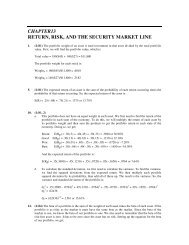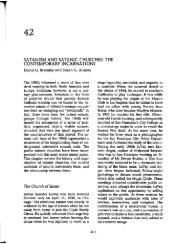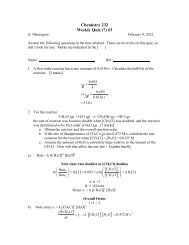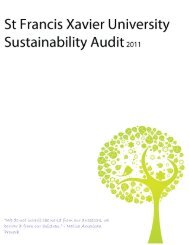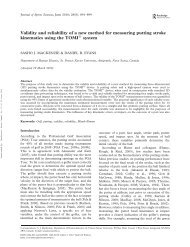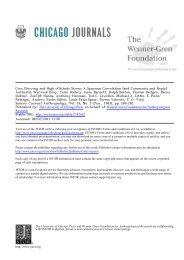ÉTIENNE GILSON AND THE ACTUS ESSENDI
ÉTIENNE GILSON AND THE ACTUS ESSENDI
ÉTIENNE GILSON AND THE ACTUS ESSENDI
You also want an ePaper? Increase the reach of your titles
YUMPU automatically turns print PDFs into web optimized ePapers that Google loves.
Dewan: Gilson and the actus essendi<br />
says that essence is found most truly in God, and this remains his thought from<br />
beginning to end. In the SCG he carefully explains how subsistence, essence,<br />
and esse are each true of God. 20 In the ST we are formally taught that essence<br />
and being are identical in God.<br />
If Thomas were really following Gilson’s path, he would have said, at 1.3.4,<br />
that “essence” signifies a potency with respect to esse, and that therefore it must<br />
be said that God has no essence, but rather is pure and simple esse; to which he<br />
might have added: unless someone would wish to call the esse his “essence.” But<br />
this is not at all what Thomas does. He rather says that, it having been shown<br />
that God is his essence, to make his esse something else than it would be to make<br />
him a caused being. Again, if one makes essence other than esse, then the<br />
essence must be a mere potency; and there is no room for potency in God.<br />
Thirdly, since God is his essence, to make his esse something else would make<br />
him a being by participation. Everywhere the insistence is on the value of the<br />
already attained view of God as identical with his own essence. It is then shown<br />
that this essence must be esse itself. The line of thinking in no way resembles<br />
Gilson’s.<br />
However, Gilson is not finished. He continues, seemingly referring to his<br />
statements about God’s “essence being to be beyond essence”:<br />
This personal approach to the problem is in keeping with the spirit of Thomism.<br />
(134)<br />
I wondered at first if he meant here his, Gilson’s, own personal approach.<br />
However, he means, rather, the (supposed) retaining of a trace of essence in the<br />
doctrine as Thomas’s own personal approach, as distinct from saying that God<br />
has no essence. In making his case for the “spirit of Thomism,” he compares it<br />
to a sea voyage, where one reckons one’s position by one’s distance from the<br />
land one has left behind. And we eventually come to this passage (which, I must<br />
say, is startling):<br />
When we reach the question, what is God? the time has come for our intellect to cast<br />
off its moorings and to set sail on the infinite ocean of pure esse, or act, whereby that<br />
which is actually is. ... What is the very last thing a concrete substance would have to<br />
give up in order to achieve utter simplicity? Its essence, of course. In our attempt to<br />
describe God by removing from Him what is proper to the being of creatures, we must<br />
give up essence in order to reach the open sea of pure actual existence, but we must<br />
also keep the notion of essence present to the mind so as not to leave it without any<br />
object. This we do when, to the question, where do we find God? we simply answer,<br />
beyond essence. By establishing himself in the definite negation of posited essence,<br />
the theologian realizes that he is placing God above that which is deepest in<br />
divine intellect and its providential power. In ch. 14, his insistence is on God having<br />
knowledge of all. And his first argument, based on Aristotle’s doctrine of God in Metaph.<br />
12, is that because in him the substance is the very act of understanding, no knowledge of<br />
anything whatsoever is lacking. And since God’s esse is “one, simple, fixed and eternal,”<br />
God has eternal and fixed knowledge of all things by one simple act of looking [uno simplici<br />
intuitu]. [Spiazzi #120].<br />
20 SCG 4.11 (ed. Pera #3472-3473), quoted earlier.<br />
77



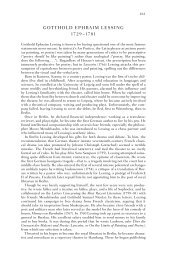
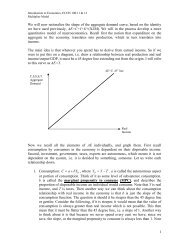
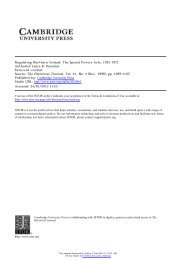
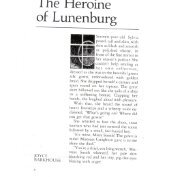
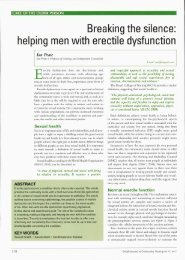
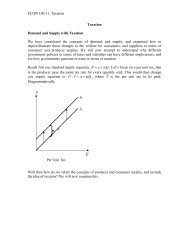
![The Rink - Cyril Dabydeen[1].pdf](https://img.yumpu.com/21946808/1/155x260/the-rink-cyril-dabydeen1pdf.jpg?quality=85)

